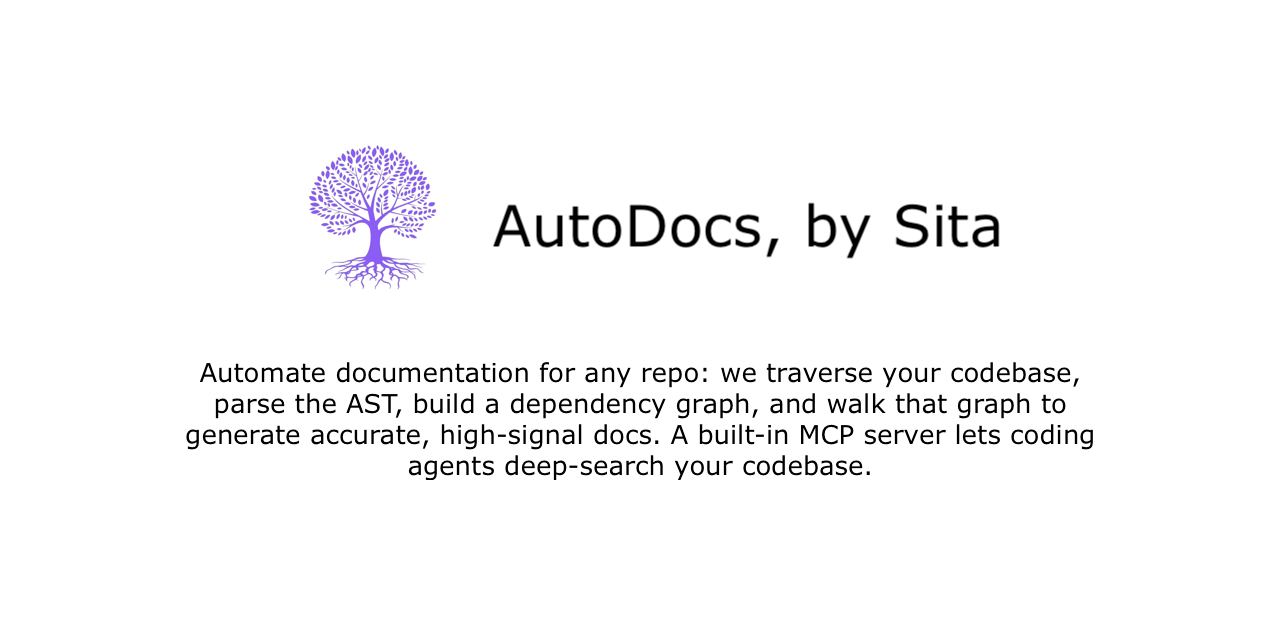https://github.com/trysita/autodocs
We handle what AI editors won't: generating and maintaining documentation for your codebase, while also providing search with dependency-aware context that helps your tools understand your codebase and its conventions.
https://github.com/trysita/autodocs
agents ai ast docker llm mcp openai opensource scip sdk sita tree-sitter
Last synced: 24 days ago
JSON representation
We handle what AI editors won't: generating and maintaining documentation for your codebase, while also providing search with dependency-aware context that helps your tools understand your codebase and its conventions.
- Host: GitHub
- URL: https://github.com/trysita/autodocs
- Owner: TrySita
- License: apache-2.0
- Created: 2025-09-07T17:26:21.000Z (about 1 month ago)
- Default Branch: main
- Last Pushed: 2025-09-17T16:23:57.000Z (25 days ago)
- Last Synced: 2025-09-17T18:51:22.336Z (25 days ago)
- Topics: agents, ai, ast, docker, llm, mcp, openai, opensource, scip, sdk, sita, tree-sitter
- Language: Python
- Homepage: https://trysita.com/
- Size: 32.2 MB
- Stars: 146
- Watchers: 1
- Forks: 8
- Open Issues: 2
-
Metadata Files:
- Readme: README.md
- Contributing: CONTRIBUTING.md
- License: LICENSE
- Code of conduct: CODE_OF_CONDUCT.md
Awesome Lists containing this project
README

Your browser does not support the video tag.
# AutoDocs, by [Sita](https://trysita.com)
Automate documentation for any repo: we traverse your codebase, parse the AST, build a dependency graph, and walk that graph to generate accurate, high-signal docs. A built-in MCP server lets coding agents deep-search your code via HTTP.
(Interested in our hosted or enterprise offerings? Join the waitlist at https://trysita.com)
## What This Repo Does
- Parses your repository using [tree-sitter](https://github.com/tree-sitter/tree-sitter) (AST parsing) and SCIP (symbol resolution).
- Constructs a code dependency graph (files, definitions, calls, imports) and topologically sorts the dependency order.
- Traverses that graph to create repository-wide, dependency-aware documentation and summaries.
- Exposes a FastAPI backend for ingestion/search and a Next.js web UI for chat and exploration.
- Provides an MCP server so agentic tools can query your repo with deep search.
---
## Prerequisites
Install these once on your machine:
- pnpm 10+ (Node 20+ recommended; Corepack is fine). [Docs](https://pnpm.io/installation)
- uv (fast Python package manager). [Docs](https://docs.astral.sh/uv/)
- Docker + Docker Compose (to run everything locally). [Docs](https://docs.docker.com/engine/install/)
Reference docs
- pnpm install: https://pnpm.io/installation
- uv install: https://docs.astral.sh/uv/
## GitHub Personal Access Token (optional)
Some features or scripts may call the GitHub API (e.g., fetching repo metadata). If you hit rate limits or need to access private repos, create a Personal Access Token (PAT) and set it in your environment.
- How-to (official docs): https://docs.github.com/en/authentication/keeping-your-account-and-data-secure/creating-a-personal-access-token
- Create fine-grained PAT (recommended): https://github.com/settings/personal-access-tokens/new
- Create classic PAT (legacy): https://github.com/settings/tokens/new
Suggested scopes
- Public repos only: use a fine-grained token with selected repositories (read-only) or a classic token with `public_repo`.
- Private repos: fine-grained token with read-only repo access to the needed repositories, or a classic token with `repo`.
Add to your `.env` (or shell env):
```bash
GITHUB_TOKEN=ghp_your_token_here
```
Notes
- Keep this token secret; do not commit `.env`.
- Fine-grained tokens are preferred for tighter, per-repo permissions.
## Quickstart (copy/paste)
1. Environment
```bash
cp .env.example .env
```
### Configuration
#### Preconfigured
- Database: `DATABASE_URL` (local postgres DB). In Compose, DB is available at `postgresql://postgres:postgres@db:5432/app`.
- Ingestion API: `INGESTION_API_URL` for the web app to call the FastAPI service.
- Analysis storage: `ANALYSIS_DB_DIR` controls where generated per-repo SQLite files live.
---
#### To-be configured
- Summaries: `SUMMARIES_API_KEY`, `SUMMARIES_MODEL`, `SUMMARIES_BASE_URL` (OpenAI-compatible, default [OpenRouter](https://openrouter.ai/))
- Embeddings: `EMBEDDINGS_API_KEY`, `EMBEDDINGS_MODEL`, `EMBEDDINGS_BASE_URL` (OpenAI-compatible, default [OpenAI](https://openai.com/api/))
- Rate limiting: `MAX_REQUESTS_PER_SECOND` for LLM summary batching (default 15)
---
2. Run locally with Docker Compose
```bash
docker compose up -d
# If you want to see logs
docker compose up
```
You should now have:
- Web UI at http://localhost:3000
- API at http://localhost:8000 (OpenAPI schema at `/schema`)
## Updating Docs
To refresh a repository’s docs after code changes, remove the repo and re-ingest it (temporary workflow):
- UI: delete the repo in your Workspace, then add it again (ingestion starts automatically).
We’re actively adding a one-click "Resync" button in the UI, followed by automatic periodic ingestion (coming soon)
## Using the MCP Server
The MCP server is available at `http://localhost:3000/api/mcp` and is designed for coding agents and MCP-compatible clients. It exposes a `codebase-qna` tool that answers repository-scoped questions by querying the analysis databases that AutoDocs produces.
Tips
- Point your MCP client at `http://localhost:3000/api/mcp`.
- Include an `x-repo-id` header with the repo ID (you can find it in the UI).
- For setup guides with popular tools (Claude, Cursor, Continue), see https://docs.trysita.com
## Development Workflow (for contributing)
For a local dev loop without Docker Compose you can run the API and web dev servers directly:
```bash
# concurrent dev (API + Web + DB)
./tools/dev.sh --sync
```
Database migration (run if modifying the postgres schema)
```bash
cd packages/shared
DATABASE_URL=postgresql://postgres:postgres@localhost:5432/app pnpm drizzle-kit push --config drizzle.main.config.ts
```
## Project Layout
- `ingestion/` — Python FastAPI service, AST parser, graph builder, embeddings, and search.
- `webview/` — Next.js app (Turborepo workspace) and shared TS packages.
- `docker-compose.yml` — local Postgres, API, and Web services.
- `tools/` — helper scripts (`build_all.sh`, `dev.sh`, `uv_export_requirements.sh`).
## Troubleshooting
- Web can’t reach the API: ensure `INGESTION_API_URL=http://api:8000` is set in `.env`.
- Missing `uv`/`pnpm`: install them (see links above)
## Known Issues
- In your repositories, code must live at the repository root, not in a nested folder.
- Language support: currently supports TS, JS, and Python; currently working on expansion to Go, Kotlin, Java, and Rust.
- Polyglot repos (multiple languages in one repo): not supported yet, but we’re actively working on it.
## License
Licensed under the Apache 2.0 License. See [LICENSE](./LICENSE).



